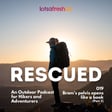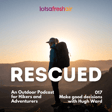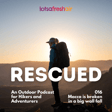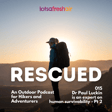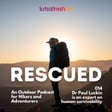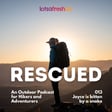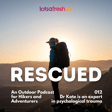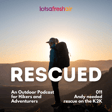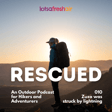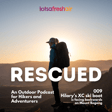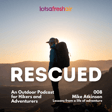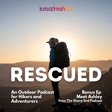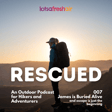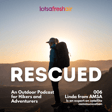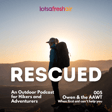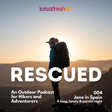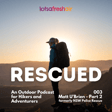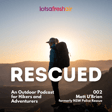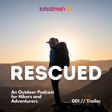
018 // Bram's pelvis opens like a book in a remote Taiwan canyon
The things we love to do in nature can lead us to explore and discover places not just close to home, but to some very remote and uncharted places around the world.
These activities, like bushwalking/hiking, climbing or canyoning, give us opportunities to step outside the typical tourist or visitor experience, not only opening our eyes to cultures different to our own, but on a deeper level, the chance to connect with the local outdoor community through our shared love of wild places.
In this special double episode of Rescued, we hear from 3 friends, all highly skilled and experienced canyoners, as they find themselves in the embrace of Taiwan’s small and dedicated canyoning and rescue community, after a life-threatening fall during a multiday expedition.
If you ever needed a reminder of the value of regular, high-quality wilderness first aid training and the importance of being able to rely on the people you adventure with - this is it.
This isn't a straightforward pack n’ send case of helicopter, paramedics and hospital. Their reliance on each other, their skills and a solid sense of humour is put to the test throughout this 2 day ordeal.
Key learnings from this episode:
- The importance of having the right skills, training and experience for the environments
- The ability to make fair self-assessments of the above
- Planning is key to better outcomes
- Research multiple contingency plans, if your exit from a canyon doesn’t work, are there alternatives you can see on satellite imagery? Plan refuge and camp spots
- Being able to rely completely on your adventure buddies if something goes wrong. Q: Can you say this about strangers you connect with on MeetUps or similar?)
- Value of research, local knowledge and connections
- Huge thanks to the incredible and supportive local canyoning community of Taiwan
- Being smart about choosing your emergency contacts and setting up a What’sApp group - briefing them all properly with plans, contingencies and giving them permission to act as your advocates if something happens
- The essential recert and muscle memory of quality wilderness first aid training
- Benefits of choosing to study Wilderness or RAFA over simple Senior First Aid
- Brainstorm and practice of roping and rescue problems at home and in easier environments before being confident to execute them in challenging ones
- Good open, inclusive and frank communication in and around a patient
- How humour can help with stressful situations
- Everyone knowing their job and getting it done
- How party size can change outcomes in an incident
- Importance of essential survival skills eg: fire making, knowing priorities for survival
- Stove, lighters and Nalgenes as essential canyon equipment
- Making sure your first aid kit is up-to-date (when was the last time you made sure you had enough panadol and ibuprofen?)
- Bright clothes, bothy bag, emergency blankets to draw attention
- Knowing how to prepare for helicopters and downwash
- Aussie registered PLBs activated overseas are received by AMSA in Canberra
There's a bunch of different ways you could help support the work of this pod:
- Leave a review on your platform of choice
- Leave a donation towards the costs
- Visit my sponsors at Paddypallin.com.au
- Buy my book - "How to Navigate - the art of traditional map and compass navigation in an Australian context."
- Check out my Navigation Courses
